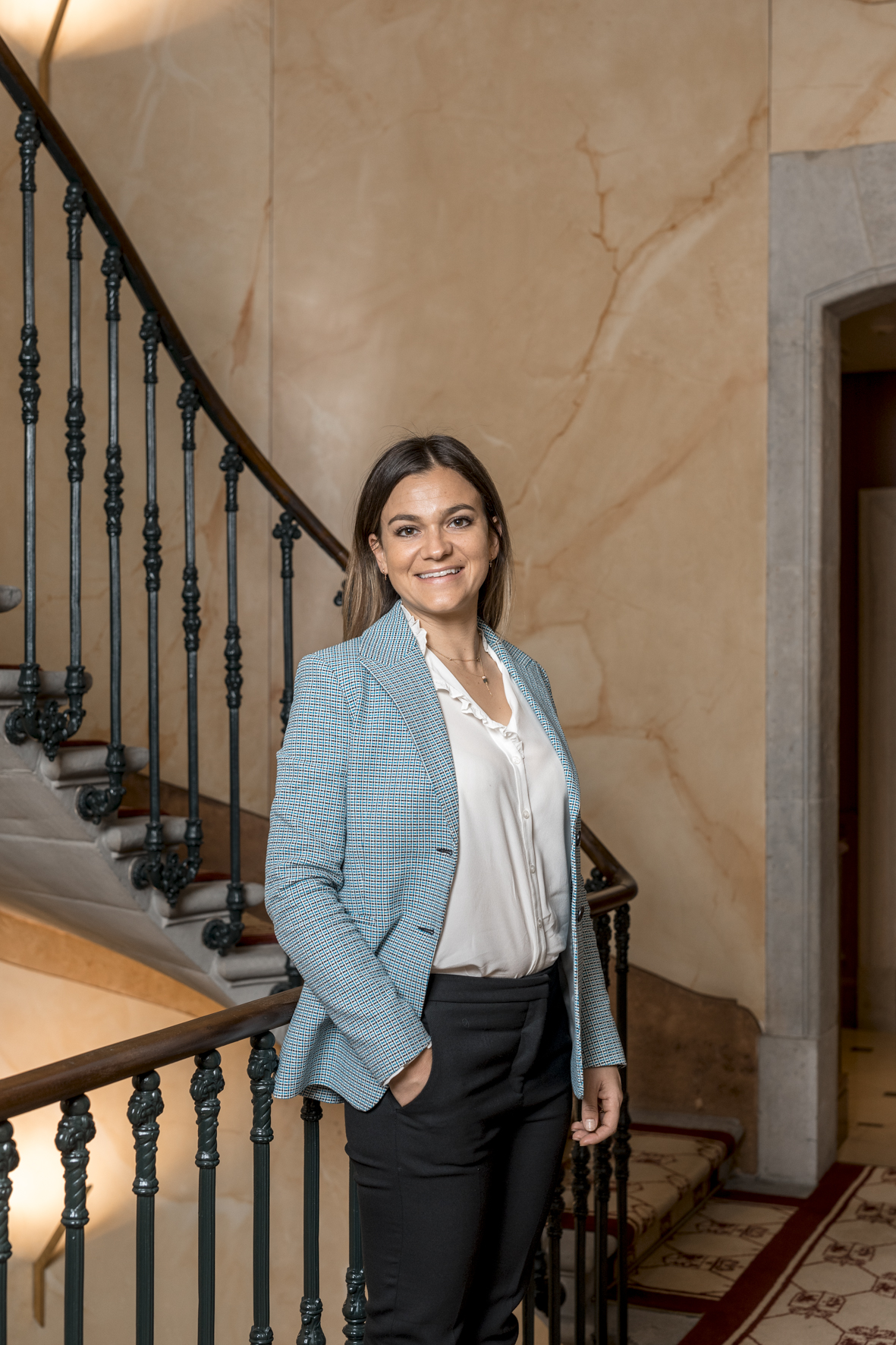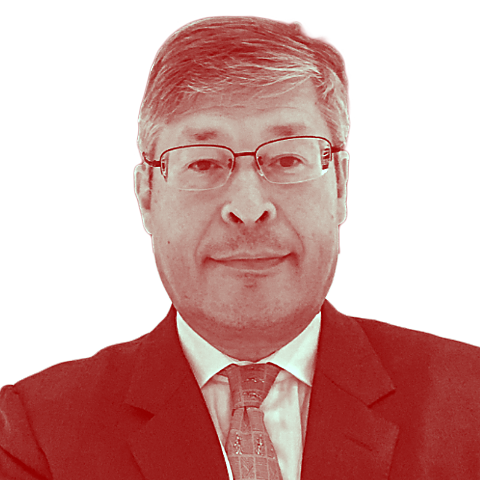
Meet the first woman at the helm of a discreet Geneva bank

Since last year, Michaela Zanello Sturdza has been in charge at Banque Eric Sturdza. The Geneva-based bank specialises in wealth management, employs just over 100 people, and manages about CHF6.5 billion ($6.96 billion). We spoke to one of the youngest chief executives in the Swiss banking industry.
SWI swissinfo.ch: Since taking office as chief executive, what have been your priorities?
Michaela Zanello Sturdza: I have focused on managing the multiple transitions we are undergoing, taking advantage of our historical strengths, and adapting them to new paradigms. One aspect is that we have had to face up to external changes, notably increased regulation of the banking industry, generational shifts among our clients and new technological developments.
Another aspect is internal. We have had a comprehensive internal review of almost everything: our product range, our back-office operations, and our compliance. But the most important internal transition has without doubt been the generational shift in our own family. All these changes have been overseen in collaboration with my father since 2018.
SWI: Your father founded and led the group that bears his name for 36 years. In your role what are the advantages and disadvantages of being his daughter, and more generally, of being a young woman?
M.Z.S.: I have always been my father’s daughter, so I don’t know any different (laughs). Although I was exposed to the family business from a young age, I never dreamed of taking it over one day. But when I started working for our bank, I gradually got caught up in it and grew passionate about it. Of course, taking over your father’s life work and working with family is not always a walk in the park.

As a woman, I have had to work twice as hard to prove myself. I have spent my career in different parts of our organisation, and it was only after years spent in the engine room of operational business that the board decided I was capable of taking the post of chief executive. I was evaluated in comparison with other candidates in a structured, impartial, professional research process.
SWI: Some CEOs, I am thinking of Elon Musk in particular, are walking advertisements with huge media reach. Others, like the CEO of Rolex, run from the press. What is your style in this respect?
M.Z.S.: My parents are discreet. “To live happily, live in hiding” could have been their motto. I think I have inherited this discretion. Of course, I admire Elon Musk but I note, too, that Rolex has succeeded in building a very strong brand while remaining discreet.
SWI: You are part of a royal family of Romanian descent. What importance does that have to you?
M.Z.S.: I never talk about it even if everyone in my circle is aware of it. It would be pretentious on my part and at my age to use the title of princess. People must judge me on my personal and professional merits and not because I was born with a title. In addition, having royal origins in Romania also means having once lost everything because of communism.
SWI: Let us return to your bank’s real business. There are hundreds of private banks in Switzerland and in the world. How do you distinguish yourselves from your competitors?
M.Z.S.: We are very much a family bank, and extremely close to our clients. The stock is mainly in our family’s hands apart from certain executives who also own shares. “Small is beautiful” is our philosophy.
We want to remain a small bank because we are convinced that our size allows us to offer a complete, high-quality service and to avoid partitioning our different units because of increasingly complex regulation.
SWI: How would you describe your typical client?
M.Z.S.: Our clientele is primarily European and consists of families of entrepreneurs. In that sense, it resembles us. A large proportion of our clientele is undergoing a generational transition; fortunately, in most cases, the next generation is staying loyal to our bank.
SWI: What is the minimum amount that a new client must entrust to your bank?
M.Z.S.: This numerical approach is typical among the big banks. We prefer to focus on closeness to our clientele. Having said that, we are of course compelled to set a minimum of about CHF1 million ($1 million) to cover fixed costs.
SWI: Hundreds of Russian citizens are now subject to sanctions because of the war in Ukraine. To what extent does this have an impact on your bank?
M.Z.S.: I can confirm – with absolute certainty and great pride – that none of our clients has been subjected to the sanctions against Russia so far, although we know the lists are being constantly extended. We need to be careful on this subject. It is not banks but governments which are boycotting Russians. The banks are only carrying out government policy.
SWI: What were the consequences for your bank of the end of banking secrecy and Switzerland’s acceptance of the automatic exchange of information?
M.Z.S.: Like all other banks, we had to manage not just the changes you have mentioned but several other financial developments over the course of the decades. What is certain is that good support from us during these transitional phases is synonymous with retaining customer loyalty.
SWI: Has your bank put in place all the measures required to avoid accepting non-declared and illicit money, including for money from developing countries?
M.Z.S.: Of course. Our name is an integral part of the name of the bank. It is unimaginable for us to take reputational risks.
SWI: In 2020, the funds managed by your bank diminished by half a billion francs. Has the situation stabilised since then?
M.Z.S.: Absolutely. This loss was due to certain important changes inside our institution as well as generational shifts among our clients. But since then, thanks to the changes mentioned earlier, we have redefined our products and beefed up our teams. These improvements are now ready to be deployed and I am looking to the future with confidence and enthusiasm.
SWI: At the core of the Eric Sturdza group, your three asset management companies are based abroad. Why not in Switzerland?
M.Z.S.: Historically these subsidiaries were created in foreign countries known and renowned for their know-how in asset management. However, we might eventually reshore some of these operations to Switzerland. That would bring our different business lines closer together.
SWI: How do you rate the framework conditions for your business in Geneva and Switzerland?
M.Z.S.: Switzerland is my native country. I appreciate its exceptional benefits, starting with the quality of life and the incredible concentration of global companies. I also admire our social security system.
Translated from French by Catherine Hickley

More
Are Swiss banks’ glass ceilings for women ready for a real shattering?

In compliance with the JTI standards
More: SWI swissinfo.ch certified by the Journalism Trust Initiative




























You can find an overview of ongoing debates with our journalists here . Please join us!
If you want to start a conversation about a topic raised in this article or want to report factual errors, email us at english@swissinfo.ch.